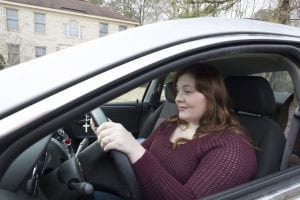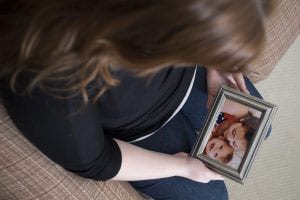above photo by Sandro Georgi Photography
Kristina was symptomatic when she was around 12 or 13 but she wasn’t diagnosed with narcolepsy until over a decade later at 24.
She thinks more people probably have narcolepsy who don’t realize it. Unfortunately it is an under-diagnosed disorder. This is reflected in Kristina’s own experience, she says, “Doctors aren’t very familiar with it, they don’t look for it. I went to maybe five doctors who checked my thyroid and iron levels and when they didn’t find anything I got written off as depressed and just lazy.”

As Kristina got older she sought out a new doctor. She went in for a respiratory infection but mentioned to her doctor that she had been involved in multiple car accidents that year because she kept falling asleep at the wheel. The doctor sent her to a sleep study to see if she had sleep apnea. She didn’t, but her results showed characteristics of narcolepsy.
“I had done research after she suggested the study, I saw narcolepsy online and thought this is me! It was a combination of things that got me diagnosed, the new doctor, the study, the hallucinations, sleep paralysis and cataplexy.”
Retrospectively she recognized so many characteristic symptoms of narcolepsy with cataplexy that plagued her, untreated, in her childhood. She reflected;
“I would get up from lunch in high school and my legs would give out a little and my face would droop a little but it wasn’t enough for other people to notice. I thought I was just tired. Or maybe that I had a brain tumor, I kept it to myself. Had my doctors known to ask about it, it would have been diagnosed earlier, I was only going in saying I’m tired. I fell asleep in my classes and in the shower. I don’t have much faith in doctors now.”
When asked how it felt to have finally received a diagnosis of narcolepsy, she expressed mostly relief and a feeling of validation.
“It kind of sucks to be diagnosed with that but it was a major weight lifted off my shoulders. I wasn’t capable of keeping up with other people quite the same but before I didn’t have a reason for it besides being lazy.

I had my eldest daughter and was living with my parents at 19 and I felt guilty, I felt like a loser because a lot of my peers were on their own.”
Now that she has a diagnosis she allows herself to listen to her body instead of fighting it.
“The medication helps and admitting it to myself helps. I have to take naps before driving. I’d be thirty minutes away from my job on 66, but it’d turn into two hours during rush hour. I would fight my body to stay awake until I had tears in my eyes. Now I can admit that I need to sleep. Sometimes at work I had to take naps but would push myself until what’s called Automatic Behavior. You enter into the first stage of sleep while still operating on automatic.”
Kristina says that narcolepsy has impacted every aspect of her life.
Besides altering her schedule for driving and work, it influences how long and well she can study and how much of a social life she is able to keep up. And when she was dating, it felt like a burden hanging over her head.
“When I was dating and knew I had narcolepsy, I was worried people were going to be scared away. It’s not a small thing. It’s a burden for people to take on and I was scared to mention it. When I started dating my husband, his parents didn’t believe I had it, maybe because of my medicine which had been working better then. They just saw me take naps sometimes. I don’t think he really understood until we were married and living together. When we were pregnant I couldn’t take my medicine and had an 8-year-old. I couldn’t really help out and he was suddenly becoming a stepdad. I’m sure it was rough for him.”

Kristina has had interactions with many people who don’t truly understand narcolepsy including doctors. “The day before my second child was born, I mentioned to the doctor that cataplexy could be triggered by emotion. I didn’t want them to place my baby on me after she was born because didn’t want to drop her. The doctor acted like she understood but I could tell she didn’t.”
It’s unnerving when the healthcare professional responsible for your medical well-being
isn’t well-versed in the diagnosis or treatment of your disorder. One of the biggest ways to increase accurate diagnoses of narcolepsy is simply to spread awareness. Spreading the word about what it’s like to live with narcolepsy can put it on physicians’ radar and help people recognize their own symptoms.
Check out more of Kristina’s story in our video series!
When Kristina’s Doctor Didn’t Know
Kristina’s Call to Others with Narcolepsy
Kristina’s Story: Narcolepsy and Stigma
Narcolepsy can’t Curb Kristina’s Ambition
Kristina’s Fight with Narcolepsy






